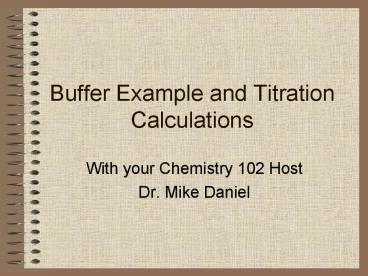Buffer Example and Titration Calculations - PowerPoint PPT Presentation
1 / 36
Title:
Buffer Example and Titration Calculations
Description:
Buffer Solutions resist a change in pH. Buffers contain relatively large concentrations of either ... 1. Stoichiometry Calc to determine how much product made ... – PowerPoint PPT presentation
Number of Views:116
Avg rating:3.0/5.0
Title: Buffer Example and Titration Calculations
1
Buffer Example and Titration Calculations
- With your Chemistry 102 Host
- Dr. Mike Daniel
2
pH Change to 1M Acetic Acid/1M Acetate Ion Soln.
0
Moles OH- Added
Moles H Added
3
Buffers
- Buffer Solutions resist a change in pH
- Buffers contain relatively large concentrations
of either - An acid, HA and its conjugate base A-
- A base, B, and its conjugate acid (BH)
4
Buffers
NH4 to react with OH-
5
Buffers
NH3 to react with H
6
Buffers
- When a strong base, H is added, it reacts
essentially to completion with the weak base
present - H A- ? HA or
- H B ? BH
7
Buffers
- When OH- is added, it reacts essentially to
completion with the weak acid present - OH- HA ? H2O A-
- OH- BH ? H2O B
8
Weak Acid Ionization
- HA H A-
- Ka H A- / HA
- Rearrange
- H Ka HA / A-
9
Weak Acid Ionization
- H Ka HA / A-
- H and pH depend mainly on Ka, and to lesser
extent ratio HA / A-
10
Weak Acid Ionization
- H Ka HA / A-
- Taking the LOG of both sides
- -Log H -Log Ka Log( HA / A- )
- pH pKa Log( HA / A- )
- pH pKa Log ( HA / A- )
11
Buffers
- pH pKa log (base/acid)
- Want pH ? pKa ? 1
- pH determined by
- Mainly by Ka of acid or and ratio of conjugate
base/acid - or
- Kb of base and ratio base/conjugate acid
12
Buffer Choice
- Want pH ? pKa ? 1
- How do I make a pH 4.0 buffer?
- Choose a pKa near the desired pH
13
Buffer Table
14
Buffer Choice
- Choose a pKa near the desired pH
- pH pKa log (base/acid)
- 4.0 3.74 log (base/acid)
- 0.26 log (base/acid)
- 10.26 1.8 (Na formate / formic acid)
15
Basic Buffer Choice
- pKa pKb pKw 14.00
- Ammonia pKb -Log (1.8 X 10-5)
- pKa NH4 14.00 4.74 9.26
- NH3 / NH4Cl used to buffer around pH 9.26
16
Buffer Capacity
- As long as ratio remains virtually constant, the
pH will be virtually constant - This is true as long as concentrations of
buffering materials (HA/A-) or (B/BH) are large
compared with H or OH- added.
17
Acid / Base Titrations
- To measure concentration of unknown
- Titrant (solution added) must be a strong acid or
strong base so reaction goes to completion.
18
Acid / Base Titrations
- Calculations to equivalence point
- 1. Stoichiometry Calc to determine how much
product made - 2. Equilibrium Calc using conjugate pair
concentrations.
19
Acid / Base Titrations Strong A B
- Follow Text page 672
- 50.0 mL of .100 M HCl titrated with .100 M NaOH
- Equivalence Point Where Stoichiometric amounts
of acid and base have been added - End Point Where indicator color change occurs
- Reaction HCl NaOH -gt NaCl H2O
20
Acid / Base Titrations Strong A B
- VMHCl 5 X 10-3 mol
- -VMNaOH
- moles of H leftover till equivalent point
reached - At equivalence point,
- initial mol HCl mol NaOH added
- 5 X 10-3 mol NaCl/(50 mL 50 mL solution)
- pH 7
21
Acid / Base Titrations Strong A B
Equivalence Point
22
Acid / Base Titrations Strong A B
HCl/NaCl buffer
23
Acid / Base Titrations Strong A B
Phenolphthalein
Bromcresol Green
24
Acid / Base Titrations Weak Acid with Strong
Base
- 50. mL of .100 M Acetic Acid (HAc) titrated with
.100 M NaOH - Initial pH calculated as before
25
Acid / Base Titrations Weak Acid with Strong
Base
- During titration up to equivalence point
- VMHAc 5 X 10-3 mol
- -VMNaOH
- moles of HAc leftover
- VMNaOH moles OH- added moles Ac-
- made
- Say 5. mL of .1 M NaOH added to 10. mL of .1 M
HAc
26
Acid / Base Titrations Weak Acid with Strong
Base
- HC2H3O2 ? H C2H3O-
27
Acid / Base Titrations Weak Acid with Strong
Base
HAc/Ac- buffer
28
Acid / Base Titrations Weak Acid with Strong
Base
- At Equivalence Point all acetic acid converted
to Acetate ion - At Equivalence Point you have a Sodium Acetate
Solution
29
Acid / Base Titrations Weak Acid with Strong
Base
- At Equivalence Point you have a Sodium Acetate
Solution - To determine pH
- Use Kb and
- C2H3O2- H2O ? HC2H3O2 OH-
- To determine OH- and H and pH
30
Acid / Base Titrations Weak Acid with Strong
Base
- At Equivalence Point you have a Sodium Acetate
Solution - pH lt or gt 7 ?
- pH 8.88
31
Acid / Base Titrations Weak Acid with Strong
Base
Equivalence Pt pH 8.88
32
Acid / Base Titrations Weak Acid with Strong
Base
- After Equivalence Point
- VMNaOH VMHAc(initial) moles OH- in total
volume. - From OH- determine H and pH
33
Acid / Base Titrations Weak Acid with Strong
Base
Phenolphthalein
Bromocresol Green
34
Acid / Base Titrations Weak Base with Strong
Acid
35
Acid / Base Titrations Weak Base with Strong
Acid
NH3/NH4 buffer
36
Acid / Base Titrations Weak Base with Strong
Acid
Phenolphthalein
Methyl Red































